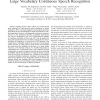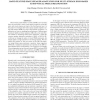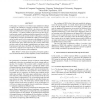135 search results - page 4 / 27 » Temporal Feature Selection for Noisy Speech Recognition |
100
click to vote
INTERSPEECH
2010
14 years 8 months ago
2010
The Lombard effect refers to the speech changes due to the immersion of the speaker in a noisy environment. Among these changes, studies have already reported acoustic modificatio...
131
click to vote
TASLP
2011
14 years 8 months ago
2011
— Missing feature theory (MFT) has demonstrated great potential for improving the noise robustness in speech recognition. MFT was mostly applied in the log-spectral domain since ...
125
click to vote
ICMCS
2005
IEEE
15 years 7 months ago
2005
IEEE
Multi-stream hidden Markov models (HMMs) have recently been very successful in audio-visual speech recognition, where the audio and visual streams are fused at the final decision...
131
Voted
IJCNN
2000
IEEE
15 years 5 months ago
2000
IEEE
This paper presents an unsupervised segmentation method for feature sequences based on competitivelearning hidden Markov models. Models associated with the nodes of the Self-Organ...
116
click to vote
ICASSP
2011
IEEE
14 years 5 months ago
2011
IEEE
In this paper, we propose a novel feature space adaptation technique to improve the robustness of speech recognition in noisy environments. Histogram equalization (HEQ) is an effe...



